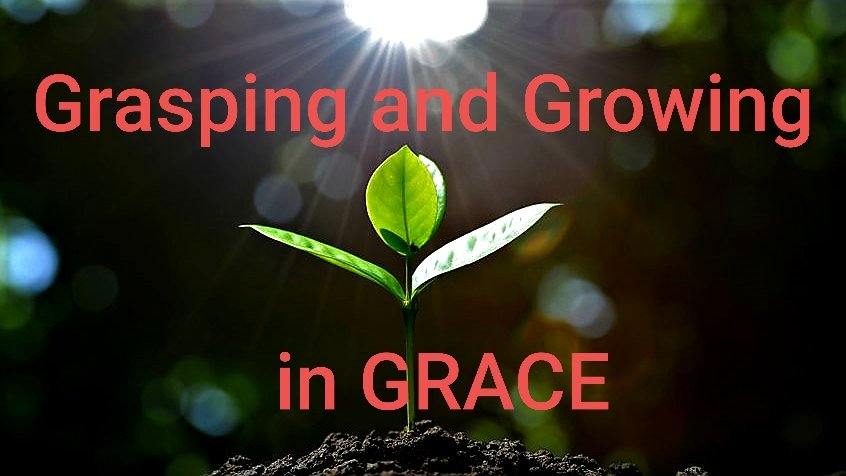
“Grace is God’s best idea. His decision to ravage a people by love, to rescue passionately, and to restore justly – what rivals it? Of all his wondrous works, grace, in my estimation, is the magnum opus” writes Pastor Max Lucado. To love someone unconditionally even when they are deliberately running away from us or hurting us is something that most natural human beings cannot do in their own strength. Grace is not just God’s idea, but this is what Jesus did to rescue us while we were lost in our sin and to restore our relationship with God.
Receiving Grace or mercy from someone after we messed up in life is an unforgettable experience. All of us who sinned or failed know the crushing feeling of guilt and shame, but when the person whom we failed compassionately forgives us or pardons our failure, it is a life changing moment that lifts the burden off our shoulders and gives us a fresh start. Since all of us are sinners by nature it is natural for us to sin, fall and fail. Apostle James says “we all stumble in many ways” (James 3:2). Apostle John says “If we say we have no sin, we deceive ourselves, and the truth is not in us” (I Jn 1:8).
All of us know how hurtful and painful it is to be judged and condemned while we are still hurting from our own failures or sin. Gordon MacDonald says “The world can do almost anything as well as or better than the church. You need not be a Christian to build houses, feed the hungry, or heal the sick. There is only one thing the world cannot do. It cannot offer grace.” Grace is the only thing we need or desperately crave when we find ourselves in the pit of sin, but that is the one thing the world cannot give because they have not experienced or received grace from God.
In Luke’s gospel chapter 7 Jesus visits the house of a Pharisee and as they were getting ready for dinner a woman who lived in a sinful life came and anointed Jesus with a very expensive perfume. She sat at the feet of Jesus crying and wiping his feet with her hair. The Pharisee was upset because he felt that she was too sinful to come this close to the Holy Rabbi. I am sure he was also upset that she came into his house; a woman of her character coming to the house of a Pharisee would ruin his reputation.
A W Tozer in his book “That Incredible Christian” writes “The Christian loses his life to save it and is in danger of losing it if he attempts to preserve it… He is strongest when he is weakest and weakest when he is strong. Though poor he has the power to make others rich, but when he becomes rich his ability to enrich others vanishes. He has most after he has given most away and has least when he possesses most… He is wisest when he knows that he knows not and knows least when he has acquired the greatest amount of knowledge. He sometimes does most by doing nothing and goes furthest when standing still… The Christian believes that in Christ he has died, yet he is more alive than ever before and he fully expects to live forever”.
Jesus looked at the Pharisee and told him a story of two people who owed money to a moneylender, one owed him five hundred denarii and the other owed him fifty. Neither of them had the money to pay him back, so he forgave the debts of both. Jesus asked him “Now which of them will love him more?” Simon the Pharisee replied “The one who had the bigger debt forgiven.” The Pharisee did not realize that he himself was a sinner who was in need of forgiveness; he saw himself as a religious and righteous man in the society with a decent reputation.
It’s ironical that Simon the Pharisee wanted Jesus to stay away from sinners but invited him to his house for dinner. If Jesus had to really stay away from sinners, he wouldn’t come to this house for dinner because Simon the Pharisee also was a sinner. The difference is that Simon did not think he was a sinner who needed forgiveness, the woman saw herself as a sinner who desperately needed forgiveness and grace. Unless we realize the depth of our sin and lostness; we will not appreciate the value of forgiveness.
The Pharisee was not only blind to his own sinfulness, but also was angry that Jesus allowed this woman who did not deserve to be in his house. Here’s a sinner who is judging and condemning another sinner, this is what happens when we don’t receive or experience grace or forgiveness. We develop a false sense of superiority, cover our own sin under the disguise of being religious, and are quick to judge others because we neither received grace nor can give grace to others.
For most Christians, Grace is an excellent subject to discuss, debate and defend theologically, but it takes a lot of humility and spiritual maturity to practice grace and give grace to others. Our ability to give grace has a lot to do with our ability to constantly receive grace from God and grow in grace on a daily basis. The more we reflect on our own deep sinfulness, the easier it becomes to approach God and receive grace. The more we receive grace, the easier it becomes to be compassionate and give grace to other friends who are struggling with sin. Let’s not just talk about grace, let’s experience and grow in Grace so that we can extend Grace to others.
Rev. Dr.Francis Burgula
